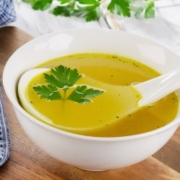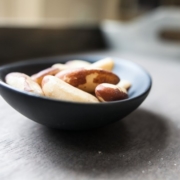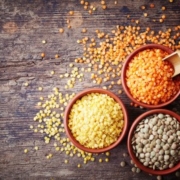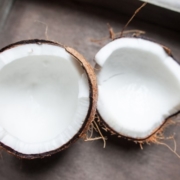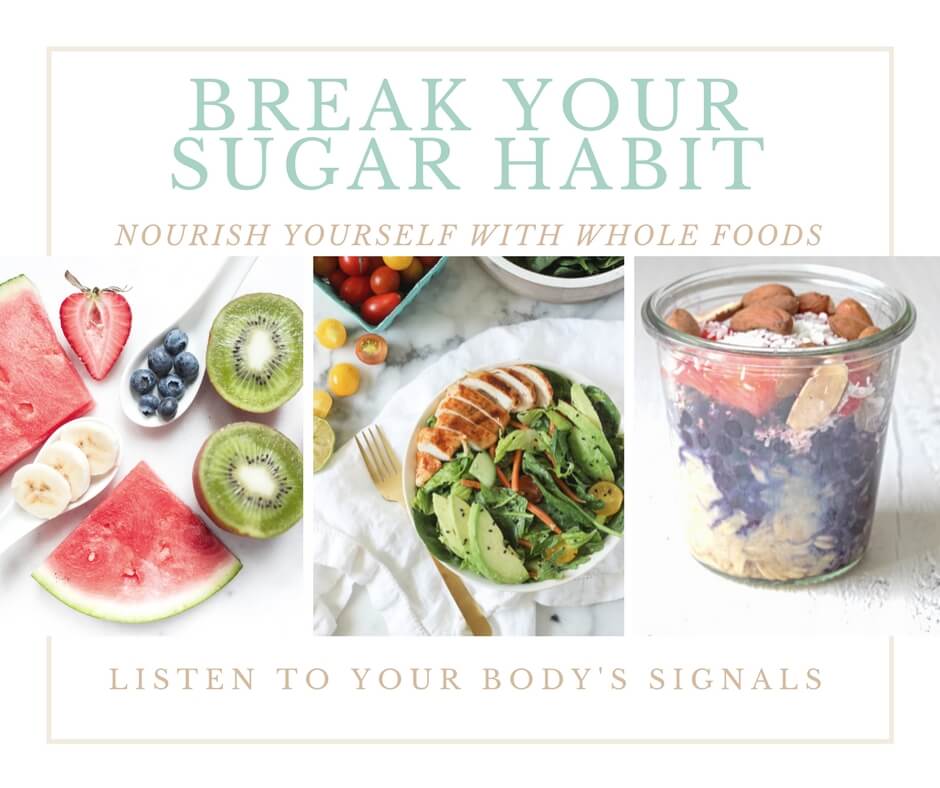
Do you consistently have sugar cravings? Do you dream of carbs, sweets, chocolate, soda, pastries, and candy? Do you feel like a failure because you can’t seem to control them?
There isn’t just anxiety and stress from the temptation – the actual eating of the sugary sweet stresses your body too. When you are eating the sugar, you feel like you’re in heaven, but in the end, you generally feel worse (and crash shortly after).
This may feel like a powerless, vicious cycle to you… But what if I told you it’s not about will power, but instead an underlying signal from your body telling you it’s unhappy. All these non-foods are devoid of nutritional value and raise your blood sugar levels drastically, followed by an equally drastic drop. Your body is a very powerful tool for tapping into what’s missing from nourishment and self care.
First, we have to understand why we’re addicted to sugar. Sugar is brain food, and our brain can become addicted to the high it gets. When you eat sugar, your brain sends signals that it is in a happy state… Which encourages more sugar consumption.
According to neuroscientist Professor Selena Bartlett of The Institute of Health and Biomedical Innovation:
“Excess sugar consumption has been proven to contribute directly to weight gain. It has also been shown to repeatedly elevate dopamine levels, which control the brain’s reward and pleasure centers in a way that is similar to many drugs of abuse including tobacco, cocaine, and morphine.
“After long-term consumption, this leads to the opposite, a reduction in dopamine levels. This leads to higher consumption of sugar to get the same level of reward.
“We have also found that, as well as an increased risk of weight gain, animals that maintain high sugar consumption and binge eating into adulthood may also face neurological and psychiatric consequences affecting mood and motivation.”
Sugar is brain food, and our brain can become addicted to the high it gets.
In short, sugar may do the following to your beautiful body:
- Cause blood sugar imbalances
- Increase your risk for diabetes, obesity, and heart disease
- Suppress your immune system
- Result in vitamin and mineral malabsorption
- Accelerate your aging
- Cause tooth decay
- Increase stress, which can increase cortisol production (our “fight or flight” hormone that tells our body to store fat for survival)
- Disrupt the delicate microbiome in your gut.
How do we break the cycle?
- Taper Slowly – Start with removing that morning pastry or after dinner dessert and replacing it with a healthy alternative (such as an NL Super Smoothie in the morning or a sliced apple with almond butter as an after dinner treat). Slowly, you can remove the other high sugar foods and see how your body reacts. It may start loving you!
- Crowd In Optimal Nutrients – This is the Nourishing Lab motto! Crowd in whole and unprocessed foods, and you will never feel deprived. We want to focus on lean and clean protein, healthy fats, the rainbow of veggies, and carbohydrates that will not raise blood glucose levels quickly (brown rice, quinoa, sweet potato, millet, and buckwheat).
- Up Your Protein Intake – Protein, protein, and protein! Your sugar cravings indicate that you’re not eating enough protein, and may be eating more refined carbohydrates. Protein is going to help regulate your blood sugar levels, which will help prevent those nasty cravings.
- Get Your Zs – This means about 7-8 hours of sleep each night. Less than this leads to the activation of the stress response and increased cortisol levels. Cortisol is a hormone that signals our body to store fat, but it also leads to sugar cravings. Do you ever experience fatigue and have more frequent sugar cravings? This is the cycle of stress (lack of sleep), cravings, weight gain, and on and on.
- Get Creative – add spices to your meals to naturally sweeten your foods and help reduce cravings. Try cinnamon (helps balance blood sugar levels), nutmeg, cloves, and coriander (to name a few).
- Be a Sugar Detective – Click here to learn how to be a sugar detective. I suggest educating yourself about what you put in your body. The longer the list of ingredients, the more likely there will be not only sugar, but other sweeteners and preservatives as well. Remember that the WHO (World Health Organization) recommends consuming 6 teaspoons (24 grams or 100 calories) of sugar a day. Most of us consume this just by drinking a small glass of orange juice in the morning, which equals 22 grams of sugar or almost 6 teaspoons. You have already reached your daily limit before you even walk out the door! I recommend an even lower sugar intake of 4 teaspoons a day.
1 teaspoon = 4 grams of sugar
1 gram of sugar = 4 calories
Be realistic with yourself, and remember that a slip is not a total failure. Allow yourself the occasional treat, but then get back on track with your health goals. One treat doesn’t need to derail you, or send you on that downward spiral of craving, eating, and crashing.
Here is a trailer for the movie FEDUP, produced by the Oscar Winning producer of The Inconvenient Truth. He documents the role sugar plays in the obesity epidemic, in addition to many diseases that our country is plagued with.

